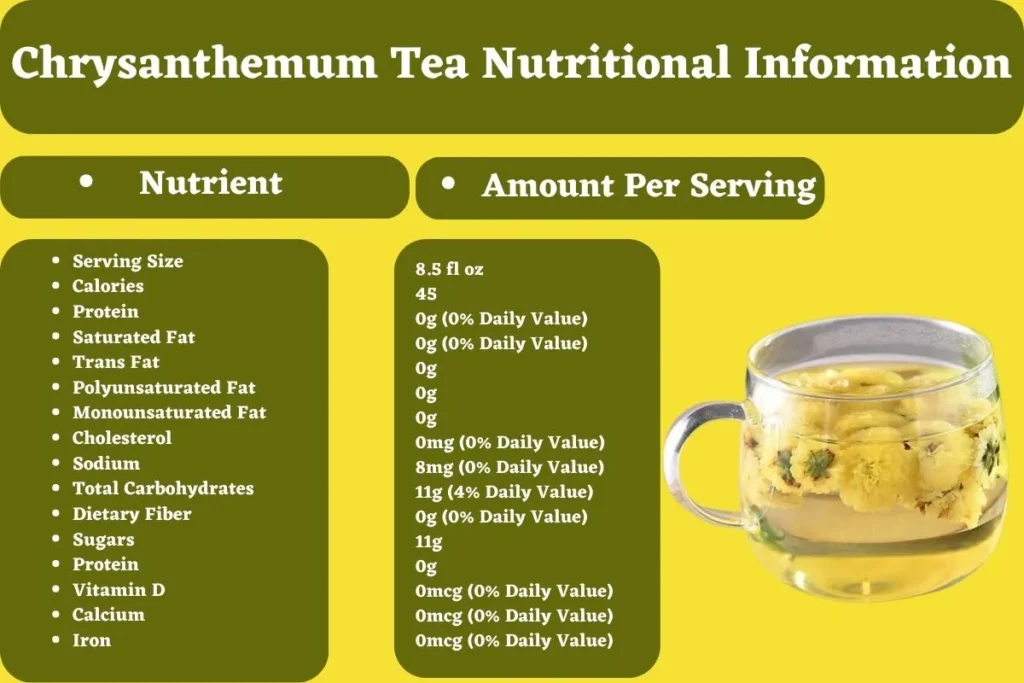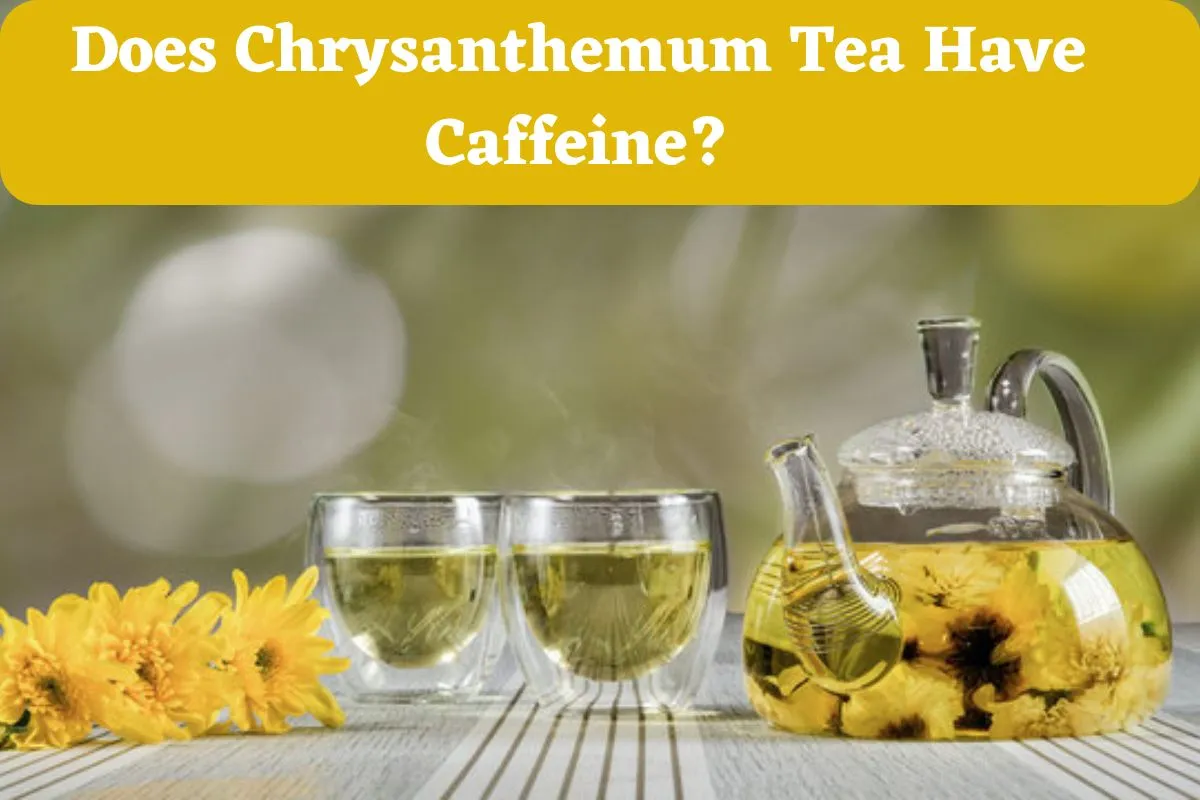Chrysanthemum tea, with its delicate floral aroma and soothing properties, has been enjoyed for centuries as a refreshing beverage. Originating from China, this herbal infusion is made from dried chrysanthemum flowers steeped in hot water, creating a light and fragrant drink.
With the growing popularity of herbal teas, many people are interested in knowing how much caffeine is in chrysanthemum tea.
Let’s investigate Does Chrysanthemum Tea Have Caffeine?
Importance of Knowing Caffeine Content in Chrysanthemum Tea
Chrysanthemum tea, revered for its myriad health benefits and cherished across cultures, particularly in China, has a storied history and significance that spans centuries. Recognized for its cooling properties in Traditional Chinese Medicine (TCM), chrysanthemum tea serves not just as a beverage but as a herbal remedy aimed at balancing the body’s yin and yang.
Its consumption is especially prominent during the Mid-Autumn Festival, symbolizing longevity and the autumn season. This tea, deeply ingrained in Chinese culture, is appreciated worldwide for its medicinal qualities and its role in fostering communal and familial bonds.
The benefits of chrysanthemum tea are vast, ranging from protecting against eye diseases and alleviating digestive issues to detoxing the liver and reducing acne. In TCM, different types of chrysanthemums are used to treat various ailments, such as lung and liver meridians, by preventing bacterial infection, reducing inflammation, and lowering blood pressure.
It’s particularly beneficial for individuals with conditions like hyperlipidemia, high cholesterol, and high blood pressure, and offers relief for those who strain their eyes from computer use.
Despite its benefits, there are specific demographics who should exercise caution or avoid chrysanthemum tea consumption. Individuals with allergies to daisies, ragweed, or marigolds may also react to chrysanthemum due to similar allergens.
Pregnant and breastfeeding women should consult healthcare providers due to the lack of conclusive research on the tea’s effects in these populations. Furthermore, given its potent effects on blood sugar and blood pressure, those on related medications should seek medical advice to prevent adverse interactions.
The importance of knowing the caffeine content in chrysanthemum tea lies not just in understanding its health implications but also in appreciating its role in various cultures as a beverage that offers both healing properties and a sense of tranquility without the buzz of caffeine.
This knowledge empowers consumers to make informed choices about their tea consumption, aligning it with their health needs and cultural practices.
Does Chrysanthemum Tea Have Caffeine?
No, Chrysanthemum tea is inherently free from caffeine, distinguishing it from many other traditional teas derived from the Camellia sinensis plant, such as black, green, and oolong teas, which all contain caffeine to varying degrees.
This lack of caffeine makes chrysanthemum tea an ideal choice for individuals seeking the calming and refreshing benefits of a warm or cold beverage without the stimulating effects associated with caffeine consumption.
The primary situation where you’ll encounter caffeine in chrysanthemum tea is with blends. If other tea varieties (like black or green tea) are added to the mix, the final beverage will contain caffeine based on those additions.
To ensure your chrysanthemum tea remains caffeine-free, opt for reputable brands that clearly source pure chrysanthemum flowers. Alternatively, look for blends that explicitly state they’re caffeine-free.
Chrysanthemum Tea Variants and their Caffeine Content
Chrysanthemum tea comes in various variants, each offering unique flavors and characteristics. Some popular variants include:
- Single-variety Chrysanthemum Tea: Made exclusively from a single type of chrysanthemum flower, such as the Hangzhou Chrysanthemum or Gongju Chrysanthemum. These teas highlight the distinct flavor profile of the specific chrysanthemum variety used.
- Blended Chrysanthemum Tea: Blends of different chrysanthemum varieties or mixed with other herbs or flowers to create complex flavor profiles. Common additions to blended chrysanthemum tea include jasmine, goji berries, or licorice root, offering a variety of aromatic and taste experiences.
- Sweetened Chrysanthemum Tea: Chrysanthemum tea that has been sweetened with ingredients like honey or sugar to enhance its flavor and appeal to those with a preference for sweeter beverages. This variant is particularly popular in ready-to-drink or bottled formats.
- Chrysanthemum Green Tea: A combination of chrysanthemum flowers and green tea leaves, offering a blend of floral and vegetal flavors. Chrysanthemum green tea provides the health benefits of both ingredients and is known for its refreshing taste.
- Chrysanthemum Pu-erh Tea: A unique blend of chrysanthemum flowers and Pu-erh tea, a fermented tea from China. This variant combines the earthy richness of Pu-erh with the floral notes of chrysanthemum, creating a harmonious and intriguing flavor profile.
- Huangshan Gongju : Also simply called Gongju , this type literally translates to “Yellow Mountain tribute chrysanthemum”. This flower is grown in the Huangshan mountains of Anhui province and was historically offered as a tribute to emperors due to its delicate flavor and appearance.
- Longan and Jujube Chrysanthemum Tea: This tea mixes chrysanthemum flowers with dried longan and jujube fruits, adding a touch of sweetness and a subtle nuttiness to the drink.
- Goji Berry Chrysanthemum Tea: This blend combines the floral taste of chrysanthemum with the slightly sweet and tart flavor of goji berries.
List of Ingredients in Chrysanthemum Tea
The ingredients in chrysanthemum tea typically include:
- Chrysanthemum Flowers: The primary ingredient in chrysanthemum tea is dried chrysanthemum flowers. These blooms give the tea a subtle floral touch and are prized for their unique flavor and scent.
- Water: Chrysanthemum tea is made primarily with water. It is heated to a specific temperature and then poured over the dried chrysanthemum flowers to extract their flavor and beneficial properties.
- Optional Sweeteners: Some people decide to improve the flavor of chrysanthemum tea by adding sweets like honey, sugar, or stevia. On the other hand, these sweeteners are optional and can be left out according to taste.
- Additional Flavorings: While not traditional, some variations of chrysanthemum tea may include additional flavorings such as lemon or mint to add complexity to the taste profile. These flavorings are added according to individual taste preferences.
Chrysanthemum Tea Nutritional Information

A single 8.5 fl oz serving of chrysanthemum tea contains approximately 45 calories. It has zero fat (saturated, trans, polyunsaturated, and monounsaturated) and zero cholesterol. You’ll find 8mg of sodium and 11g of total carbohydrates, including 11g of sugar. Chrysanthemum tea offers negligible amounts of dietary fiber, protein, Vitamin D, calcium, and iron.
| Nutrition Facts | Amount Per Serving |
| Serving Size | 8.5 fl oz |
| Calories | 45 |
| Total Fat | 0g (0% Daily Value) |
| Saturated Fat | 0g (0% Daily Value) |
| Trans Fat | 0g |
| Polyunsaturated Fat | 0g |
| Monounsaturated Fat | 0g |
| Cholesterol | 0mg (0% Daily Value) |
| Sodium | 8mg (0% Daily Value) |
| Total Carbohydrates | 11g (4% Daily Value) |
| Dietary Fiber | 0g (0% Daily Value) |
| Sugars | 11g |
| Protein | 0g |
| Vitamin D | 0mcg (0% Daily Value) |
| Calcium | 0mg (0% Daily Value) |
| Iron | 0mg (0% Daily Value) |
Read Also:
👉Does Chamomile Tea Have Caffeine
👉Does Ginger Tea Have Caffeine
Alternatives to Chrysanthemum Tea and their Caffeine Content
If you’re looking for alternatives to Chrysanthemum tea, particularly those without caffeine, there are several options you might find appealing.
Rooibos Tea
This tea is a popular caffeine-free alternative made from the leaves of the Aspalathus linearis shrub from South Africa. Rooibos tea is known for its antioxidant properties and has a smooth, slightly nutty flavor.
Ginger Tea
Known for aiding digestion and relieving nausea, ginger tea has a spicy, invigorating taste. It’s made from the root of the Zingiber officinale plant and can be enjoyed with a bit of honey or lemon.
Camomile Tea
Made from the flowers of the chamomile plant, this camomile tea is renowned for its calming properties and is often consumed to aid sleep. It has a gentle, floral taste with subtle apple undertones.
Fruit Tisanes
These are not true teas but rather infusions made from dried fruits, flowers, and herbs. They offer a wide range of flavors and are naturally caffeine-free. Common ingredients include apple, hibiscus, berries, and rosehips.
Peppermint Tea
Refreshing and cooling, peppermint tea is great for digestion and has a zingy, fresh flavor. It can be made from either fresh or dried peppermint leaves.
Chaga Mushroom Tea
For those looking for something unique, Chaga mushroom tea is a caffeine-free option with earthy, slightly bitter flavors. It’s known for its high antioxidant content.
Mamaki Tea
Originating from Hawaii, mamaki tea is made from the leaves of the mamaki plant. It offers a green tea-like flavor but without caffeine, and it’s believed to have various health benefits, including stimulating brain activity.
Chicory Root
Often used as a coffee substitute, chicory root tastes similar to coffee but without caffeine. It’s rich in inulin, a prebiotic fiber that supports gut health.
Maca
A superfood known for its energy-boosting properties, maca root helps balance hormones and manage stress levels.
Rhodiola
An adaptogen that reduces fatigue and enhances mood, rhodiola is a good alternative for those looking to decrease their caffeine intake but maintain mental alertness.
| Tea | Caffeine Content |
| Rooibos Tea | Caffeine-free |
| Ginger Tea | Caffeine-free |
| Camomile Tea | Caffeine-free |
| Fruit Tisanes | Caffeine-free |
| Peppermint Tea | Caffeine-free |
| Chaga Mushroom Tea | Caffeine-free |
| Mamaki Tea | Caffeine-free |
| Chicory Root | Caffeine-free |
| Maca | Caffeine-free |
| Rhodiola | Caffeine-free |
Conclusion
Does Chrysanthemum Tea Have Caffeine? No, Chrysanthemum tea offers a delightful and naturally caffeine-free option when brewed from pure chrysanthemum flowers. Its delicate floral flavors and potential health benefits make it an appealing beverage for those seeking a relaxing and refreshing drink.
It’s essential to be aware that blends containing traditional teas like black, green, or pu-erh will introduce caffeine. By understanding the types of chrysanthemum tea and carefully checking ingredients, you can easily tailor your selection to suit your caffeine preferences and enjoy the wonders of this lovely floral tea.
Frequently Asked Questions
Q1. What is the benefit of chrysanthemum tea?
Chrysanthemum tea boasts a delicate flavor along with potential health benefits. In Traditional Chinese Medicine, it’s used as a “cooling” herb to reduce inflammation and aid with ailments like fever and headache. It contains antioxidants and may possess anti-inflammatory properties. While more research is needed to fully understand these effects, chrysanthemum tea can be a soothing and potentially beneficial addition to a healthy lifestyle.
Q2. Can I drink chrysanthemum tea everyday?
Generally, moderate consumption of chrysanthemum tea is considered safe for most people. If you experience any unusual reactions, have underlying health conditions, or are taking medications, it’s always best to consult with your doctor before making it a daily habit.
Q3. Does chrysanthemum tea make you sleepy?
Chrysanthemum tea has a reputation for its calming effects. It can promote relaxation and potentially help alleviate stress or anxiety, which might indirectly contribute to better sleep for some individuals. It doesn’t directly contain sleep-inducing compounds.
Q4. Does chrysanthemum tea have side effects?
Chrysanthemum tea is generally well-tolerated, but some people might experience mild side effects like upset stomach or sensitivity to sunlight. Those allergic to plants in the Asteraceae/Compositae family (like ragweed or daisies) should exercise caution as they may have reactions to chrysanthemum.
Q5. Can I drink chrysanthemum tea on an empty stomach?
For most people, drinking chrysanthemum tea on an empty stomach is usually fine. If you have a sensitive stomach and experience any discomfort, try enjoying your tea with a snack or after a meal.
Know More:
👉Does Latte Have Caffeine?
👉Does Starry Have Caffeine?
👉Does Fresca Have Caffeine?
👉Does Moringa Have Caffeine?

Rossi Glover, the passionate Owner of Grand Lake Coffee, infuses every cup with her love for coffee and dedication to quality. With an extensive background in the art and science of coffee, Rossi is not just a connoisseur but a storyteller, sharing the intricate tales behind each brew.

